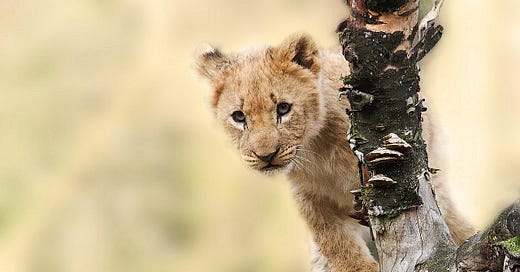Snarl, the Novel, is in production
A "companion" or study guide called A Snarl Theology for book clubs will be finished soon.
Wipf & Stock have accepted my book, Snarl, as one of their fiction releases for 2022. As part of the novel release, I've prepared a "companion" or study guide for book clubs. This excerpt from A Snarl Theology, the thinking premise behind the novel, lays out some of the notions found in the book.
Steve Hall said to keep folks updated on Homeless Catholic about the book. I'll do something every month. Still looking for a publisher for Homeless Catholic, the book, but this novel is a good sign of God is smiling kindly on me. You can find out more about Snarl at www.snarlthelion.com.
Image by Christine Sponchia
Excerpt from Chapter 1 of A Snarl Theology:
In Judeo-Christian studies of God, the animal kingdom rarely exists beyond the backdrop. Looking at Snarl’s woven lives of animals and humans, not just in contrast where brutality and compassion collide, but in sync, a mix of rush and calm where God must be involved, the scene goes way beyond the static staging we assume. It’s time to change the way the stage is set. We and animals are the same, and yet not the same, and the difference matters for all of creation due to God’s invested role in our lives.
Read every creation story with tales of frogs, wolves, eagles, and giant fish. You see the notion of animals melded or morphed into various gods. Animals and we appear to be the same in these stories, able to be gods, with a slight uplift to the human creature. Theologies from myths remain largely mythical to a Christian-trained mind. I bring this up to assure you that stories outside the Judeo-Christian frame do not mold Snarl Theology. Not purposely. I may periodically fail and go off-script. I’m not certain.
Our discussion of theology here, though, rejects an inclusive-minded pantheism where God is everything. The Snarl theological exercise is meant to delve deeper into our friendship as creatures among all living beings as described by a trinity-revealed God, and religions bent on worshipping and collaborating with the Father, Son, and Holy Spirit. We will rely upon Christian influences, Catholic Church scholarship, and the scriptural revelations of patristic fathers, theologians, and doctors of the church.
This theology tackles the details of God’s purpose, place, and person within the limits of our Christian faith. The intention of this theology at a most basic level is to make sure our existence is not accidental, not just a function of evolution, and not merely a temporary appearance. God, then, as three persons in one, has relationships to every aspect of his creation, and that’s the whole point of a Snarl Theology. These are my limitations, and John Sorensen’s, so we’re admitting them.
What, then, about the Judeo-Christian view of the animal kingdom? Are creatures not supposed to be just our backdrop?
The scene set in theological circles usually positions people in communication only with their God and themselves. That makes perfect sense. Animals sit, fly, run, swim, or wrestle with humans, but not with theology. Our co-citizens of earth end up as props or idyllic elements of the scenery, rarely described as participants and collaborators with the divine. Whether we know it or not, though, God is very aware of their existence. He has gone to great lengths to toss all species into the salad of life.
When God joined us as a babe he did so in a cave where creatures lived, not humans. Humans were dragged unwilling there, forced to birth him in hay, place him in a lamb’s manger, and warm him with the breath of beasts. Shepherds, caked in the smell and oil of sheep arrived as the first witnesses. Weeks (likely years) passed before kings arrived, and camels brought them. The cast of the animal kingdom wasn’t just backdropping.
God didn’t create semi and fully-sentient [1] beings merely as a test tube preparation for humans. The trial and error deduction found by some in science disregards God’s design. Accidents and malformations take place from an ordered layout. The layout as God created the universe matters. This is critical in Christian thought, arising from and maintaining a doctrinal, consistent biblical worldview.
[1] I’ve been advised to explain sentience, and why it matters in describing living beings. Sentience is a combo word, taking conscience and thought together. A sentient being has memories, formed ethics, and derives an idea from experience and knowledge of things. Few people imagine birds, fish, or even dogs as sentient. Though minimal in the smallest of brains, and often regarded as “instinct,” the training of animals and the existence of animal languages allows them to be seen as sentient.





